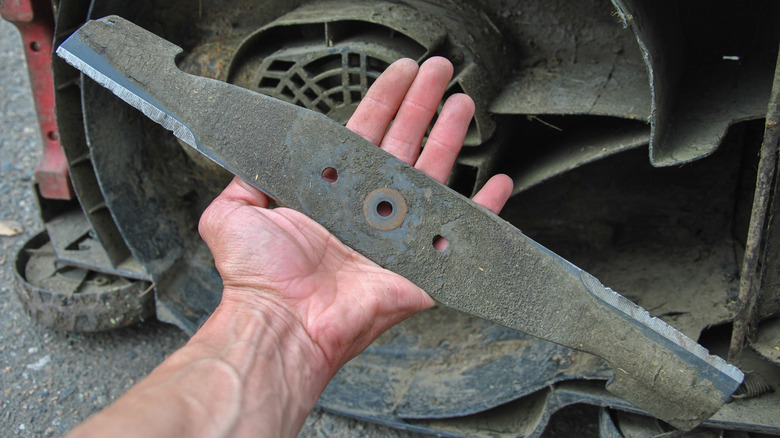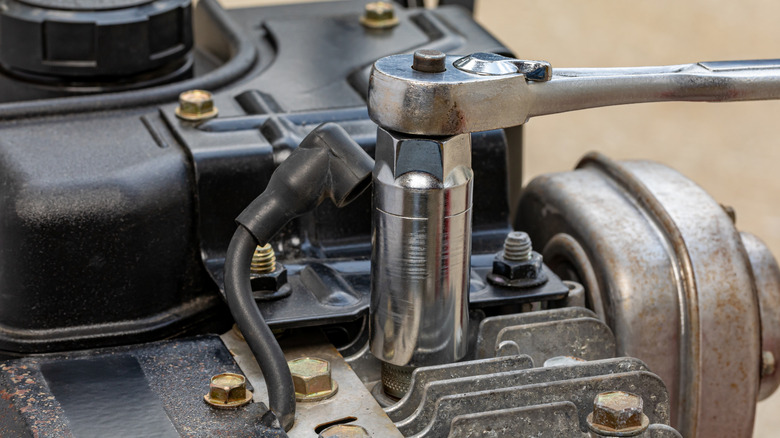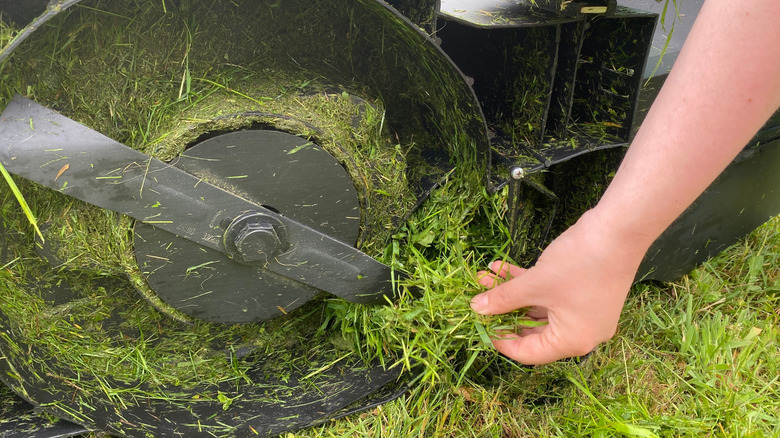This One Step Could Save Your Fingers When Changing A Lawn Mower Blade
Your mower isn't likely to start while you're changing its blade, but you're not going to cut your hand off in a likely accident. If a massive injury like this happens, it will be an unlikely accident. But an unlikely thing that could happen while you're changing a mower blade — or clearing an obstruction or storing the mower — is that the machine could kick on, or at least turn over forcefully. Yes, the one time your mower starts without coaxing may be exactly the one moment you least want it to.
The solution, for the most part, is a simple and fairly effective lawn mower safety tip everyone should know: pull the spark plug "cap" (the cover at the end of the plug wire) off the spark plug so that accidental ignition of the engine can't (or, at least, probably won't) take place. This is especially important when you're having substantial contact with the blade, as you would when sharpening mower blades without removing them.
There are lots of theories about how this accidental starting might happen, most of which don't appear to be relevant to modern mowers. But mower experts, manufacturers, and consumer advocates all agree that you're better off with the spark plug disconnected. The idea is that, because walk-behind mower blades are attached directly to the engine's crankshaft, turning the blade can start the engine in much the same way that old propeller airplane engines were started: by spinning the blade. And while modern mower safety mechanisms largely eliminate this possibility, there are other issues that can cause an engine to start or a blade to spin unexpectedly, and that's never a good thing.
How likely is the blade to start a mower engine?
Mower and mower engine manufacturers like Honda and Troybilt often recommend disconnecting the spark plug cap before handling mower blades and before cleaning or even inspecting the mower. This is because there are a number of mechanisms, including a fair number of design flaws, that can cause a mower to start or turn over accidentally. For example, some older mowers without blade brakes were turned off by using a momentary switch that grounded the spark plug to the mower's frame. Since a momentary switch only closes a circuit while it's being pressed, this means that the mower is otherwise in a state of perpetual readiness to run. These types of mower engines can, indeed, start like an old prop plane.
Remember that it doesn't take an engine starting to relieve you of excess fingers. The American Society for Surgery of the Hand claims that clearing mower deck obstructions is dangerous even with the spark plug disconnected because "the machine will likely still have one 'turn' remaining in the motor/gears even after the power is disconnected," owing to some lingering potential energy in the form of engine compression.
To get a sense of how common this problem is, we examined three years of complaints and recalls as collected by the Consumer Products Safety Commission and found no reports of mowers starting by turning a blade. This, of course, doesn't mean it didn't happen, but only that it was not reported in a way captured by the CPSC's surveillance. But there were some related and genuinely frightening reports that are as bad as the airplane prop issue ... or worse.
Documented accidental engine starting and related dangers
Our journey through consumer product accidents and recalls turned up a number of ways that mowers can start accidentally and without warning. This is particularly true for electric mowers, which might affect your decision about whether a gas- or battery-powered mower is right for you. One battery-operated DeWalt mower was recalled because water getting into the mower's handle support could cause the mower to start without the (otherwise required) key. Another man reported that he was investigating what he thought was a faulty safety system on his Makita electric mower when it started unexpectedly. Another owner confirmed that the safety mechanism that requires two actions to start an electric mower didn't work, and that it could be operated with either mechanism instead. And a couple of consumers reported that their mowers started when they were folding the handles for storage. All of this seems to point to the precaution of disconnecting or removing an electric mower's battery whenever the mower is not in use.
If you're concerned about a gasoline mower starting unexpectedly, there are a couple of additional steps you can take beyond removing the spark plug cap. One manufacturer recommends grounding the spark plug wire against the engine — the exact mechanism used by the momentary switch discussed above. But this isn't entirely foolproof, since (as one patent application notes) plug wires can have a memory effect that causes them to return to the position they're normally in, possibly reconnecting with the spark plug. If you're concerned about that, the expedient thing to do is probably to remove the spark plug(s) entirely while you're cleaning or working on the mower.


